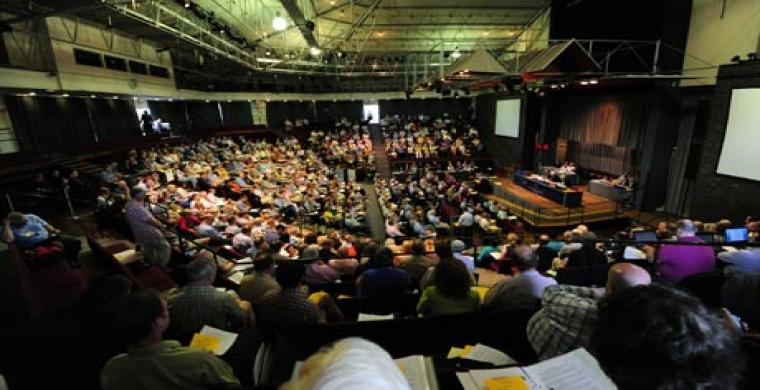YORK: Day 1 in Synod – Sessions framed around approval of women bishops
By Chris Sugden in York
http://anglicanmainstream.org/today-in-synod-friday-july-11/
July 11, 2014
The General Synod opened this afternoon in York against an impressive new purple and gold backdrop that ‘moved synod from the 70’s to the 21st century’ we were told, or resembled the flightdeck of the Starship Enterprise. It is more expensive to store it for another year than dispose of it at the close of synod.
The five day sessions will be framed by the final stages of approval of the women bishops’ legislation on which the decisive vote will take place on Monday. Pete Spiers from Liverpool urged those who could not support the legislation to abstain. Susie Leafe the director of Reform asked that credibility be given to the wish for all to flourish by invitations from dioceses and their synods to conservative evangelicals to make the conservative evangelical position plain. Philip Giddings in discussion on the question of the appointment of a conservative evangelical bishop stressed that the five principles governing the legislation meant that proper recognition be given to people even if some thought their views on headship were wrong.
Sessions begin with a debate on the agenda, or rather with speeches regretting what is not on the agenda. Professor Richard Burridge in the opening debate urged that synod spend more time engaged in serious theological and biblical discussion and reflection on issues. Mary Durlacher asked that there be more teaching in synod from biblical exposition. Mary Judkins asked for consideration of Christians undergoing persecution in Iraq, Syria and other countries. A bishop from Sudan will be a visitor to Synod over the weekend.
The Bishop of Durham, Paul Butler led synod through agreement to a draft measure on safeguarding which will make training in safeguarding procedures manadatory for all clergy and lay readers. April Alexander criticized David Blunkett who on Any Questions likened being the victim of child abuse to being the object of phone hacking: “He does not get it.” Some members of synod who did get it spoke in the debate in favour of the new measures as they themselves had been abused as children. The debate was attended by victim survivor groups who later met with the Bishop of Durham. It was revealed during the debate that one in four people, or one in six depending on gender have been the victims of abuse. It was also revealed in Questions that 50% of Church of England churches are attended by fewer than five people under 16.
An issue that emerged in a meeting of the clergy and bishops of the Province of Canterbury was whether new Guidelines for the Professional Conduct of the clergy should or should not require clergy to report to the authorities confessions of child abuse given under the seal of the confessional. Further the current draft guidelines while ruling against marital infidelity do not clearly state that chastity is required of single clergy.
In Questions, the only questions the Archbishop of Canterbury answered were on Evangelism and relations with the Anglican Church of North America. His adviser on evangelism told a separate meeting of synod members that the Archbishop’s commitment was to evangelism and the Archbishop told synod that resources from his task group would be available to parishes in early 2015. On ACNA he told synod that his plan to meet all primates of the Communion by the end of 2014 was on track, having visited 24 so far. He could not enforce reconciliation and felt the cost of disagreement.
In answer to a range of questions on same sex marriage, the Bishop of Willesden maintained a consistent approach that clergy had promised to abide the teaching and practice of the Church of England in their behaviour while they were free to criticize it, and that their promise in canon law required a different standard of behaviour from that required of lay people. The Bishop of Sheffield affirmed that “none of the statements of the House of Bishops in recent months had signaled a change in the Church of England’s teaching and practice or an objective on the part of the House or College in securing such a change. “ He outlined that the “good disagreement” which the facilitated conversations would seek to achieve was to disagree Christianly and live with a good understanding of the other’s point of view. Two major biblical studies from different perspectives would resource the facilitated conversations.
As synod closed for the night word spread of the articles in the Daily Mail by Lord Carey and in the Times by Archbishop Welby, taking different sides in the debate on assisted dying. Journalists were keen to discover the reaction of synod members to these differing views. It is possible that this issue will take over from the women bishops issue where Annelise Barron, an Anglo-Catholic woman member, urged that a new spirit of trust and understanding was pervading relationships in synod on the matter.
The Rev. Dr. Chris Sugden of Anglican Mainstream is reporting on Synod for Virtueonline














